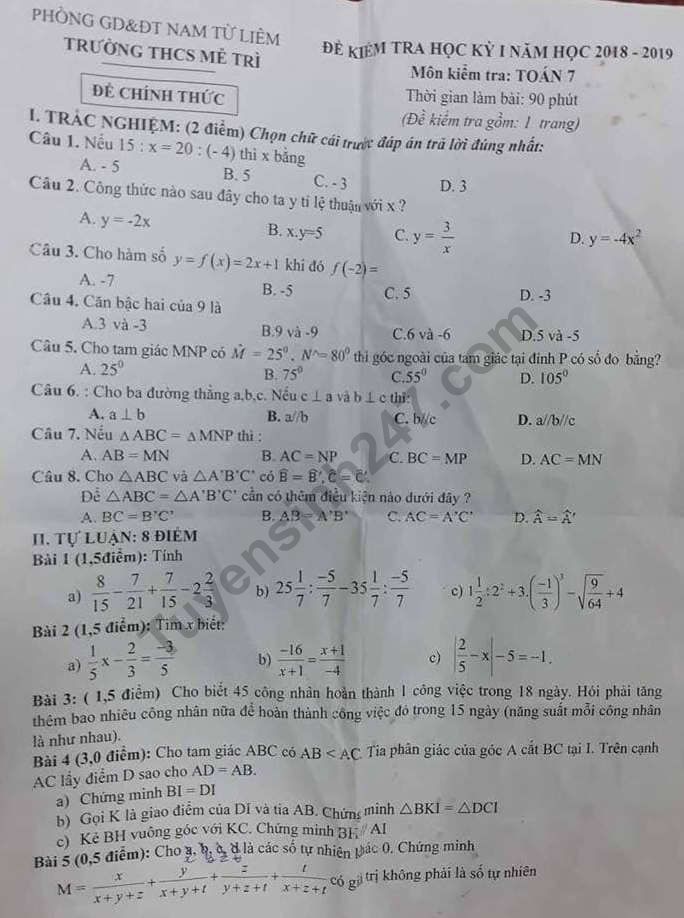Hãy nhập câu hỏi của bạn vào đây, nếu là tài khoản VIP, bạn sẽ được ưu tiên trả lời.

Giải:
a) \(3x\left(12x-4\right)-9x\left(4x-3\right)=30\)
\(\Leftrightarrow36x^2-12x-36x^2+27x=30\)
\(\Leftrightarrow-12x+27x=30\)
\(\Leftrightarrow15x=30\)
\(\Leftrightarrow x=2\)
Vậy ...
b) \(2x\left(x-1\right)+x\left(5-2x\right)=15\)
\(\Leftrightarrow2x^2-2x+5x-2x^2=15\)
\(\Leftrightarrow-2x+5x=15\)
\(\Leftrightarrow3x=15\)
\(\Leftrightarrow x=5\)
Vậy ...

Câu 3:
a: Theo đề ta có: P(2014)=0
\(\Leftrightarrow2014^2-2014k+2014=0\)
=>4058210-2014k=0
=>k=2015
Vậy: \(P\left(x\right)=x^2-2015x+2014\)
b: \(P\left(1\right)=1-2015+2014=0\)
nên x=1 là nghiệm của P(x)

Ta có /x-2016/ lớn hơn hoặc bằng 0 với mọi x
=>1,7-/x-2016/ nhỏ hơn hoặc bằng 1,7
Vậy giá trị lớn nhất của 1,7-/x-2016/là 1,7 đạt được khi x=2016

\(A=\left(13+x\right)\left(17+x\right)\left(2-x\right)\le0\)
Nếu \(x< -17\), ta có 13 + x < 0, 17 + x \(\le\) 0, 2 - x > 0
Vậy nên A \(>\) 0,
Nếu \(-17\le x\le-13\), ta có: 13 + x < 0 , 17 + x > 0, 12 - x > 0. Vậy thì \(A\le0\)
Nếu \(-13< x< 2\), ta có: 13 + x > 0, 17 + x > 0, 2 - x > 0. Vậy nên \(A>0\)
Nếu \(x\ge2\) , ta có \(13+x>0,17+x>0,2-x\ge0\). Vậy nên \(A\le0\)
Vậy để \(A\le0\) thì \(-17\le x\le-13\) hoặc \(x\ge2.\)

\(K=-3x^2-y^2+8x-2xy+2\)
\(=\left(-2x^2+8x-8\right)+\left(-x^2-2xy-y^2\right)+10\)
\(=-2\left(x^2-4x+4\right)-\left(x^2+2xy+y^2\right)+10\)
\(=-2\left(x-2\right)^2-\left(x+y\right)^2+10\ge10\)
Xảy ra khi \(\left\{{}\begin{matrix}-2\left(x-2\right)^2=0\\-\left(x+y\right)^2=0\end{matrix}\right.\)\(\Rightarrow\left\{{}\begin{matrix}x-2=0\\x=-y\end{matrix}\right.\)\(\Rightarrow\left\{{}\begin{matrix}x=2\\y=-2\end{matrix}\right.\)

b/ \(\left|\left|3x-1+9\right|\right|=-\left(-31\right)\)
<=> \(\left|\left|3x+8\right|\right|=31\)
<=> \(\left|3x+8\right|=31\)
<=> \(\orbr{\begin{cases}3x+8=-31\\3x+8=31\end{cases}}\)
<=> \(\orbr{\begin{cases}3x=-39\\3x=23\end{cases}}\)
<=> \(\orbr{\begin{cases}x=-13\\x=\frac{23}{3}\end{cases}}\)
 Giusp mình làm đề này nha!
Giusp mình làm đề này nha!